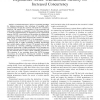Free Online Productivity Tools
i2Speak
i2Symbol
i2OCR
iTex2Img
iWeb2Print
iWeb2Shot
i2Type
iPdf2Split
iPdf2Merge
i2Bopomofo
i2Arabic
i2Style
i2Image
i2PDF
iLatex2Rtf
Sci2ools
107
click to vote
MICRO
2008
IEEE
2008
IEEE
Dependence-aware transactional memory for increased concurrency
—Transactional memory (TM) is a promising paradigm for helping programmers take advantage of emerging multicore platforms. Though they perform well under low contention, hardware TM systems have a reputation of not performing well under high contention, as compared to locks. This paper presents a model and implementation of dependence-aware transactional memory (DATM), a novel solution to the problem of scaling under contention. Unlike many proposals to deal with write-shared data (which arise in common data structures like counters and linked lists), DATM operates transparently to the programmer. The main idea in DATM is to accept any transaction execution interleaving that is conflict serializable, including interleavings that contain simple conflicts. Current TM systems reduce useful concurrency by restarting conflicting transactions, even if the execution interleaving is conflict serializable. DATM manages dependences between uncommitted transactions, sometimes forwarding dat...
Related Content
| Added | 31 May 2010 |
| Updated | 31 May 2010 |
| Type | Conference |
| Year | 2008 |
| Where | MICRO |
| Authors | Hany E. Ramadan, Christopher J. Rossbach, Emmett Witchel |
Comments (0)

